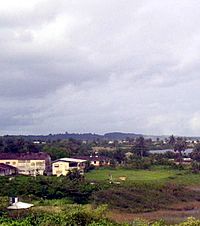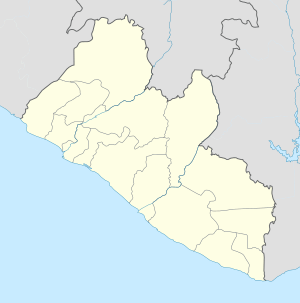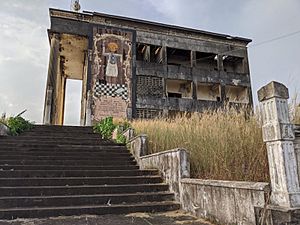Harper, Liberia facts for kids
Quick facts for kids
Harper
|
|
|---|---|

Harper in 2004
|
|
| Country | |
| County | Maryland County |
| Population
(2008)
|
|
| • Total | 17,837 |
| Climate | Af |
Harper is a city in Liberia, a country in West Africa. It is located on Cape Palmas and is the main city of Maryland County. Harper is a coastal town, meaning it sits right between the Atlantic Ocean and the Hoffman River. It is Liberia's 11th largest city, with about 17,837 people living there.
Contents
What's in a Name?
The city of Harper got its name from Robert Goodloe Harper. He was an important politician in the United States. He was also a member of the American Colonization Society. This group helped free African Americans move to Africa. Robert Goodloe Harper was the one who suggested the name "Liberia" for the new settlement. So, the city of Harper was named to honor him. Harper was once the capital of a small, independent country called the Republic of Maryland. This country existed from 1834 to 1857.
Exploring Harper's Geography
Harper enjoys warm ocean temperatures all year round. The waters are full of fish, and you might even spot whales and dolphins. Large oysters are also found here. People use traditional Fanti canoes to travel from Harper to Monrovia, Liberia's capital. This trip can take several days depending on the wind and weather. A special ship, the MV Catarina, also sails between Harper and Monrovia every two weeks. If you are coming from the Ivory Coast, you can reach Harper from the town of Tabou.
Famous Landmarks in Harper
Harper has some interesting landmarks. One is the old, ruined house of William Tubman. He was a former President of Liberia. Another important landmark is the shell of the Morning Star Masonic Lodge. This building was also built by President Tubman.
Harper's Rich History
Early Days: Americo-Liberian Period
Harper was the capital of the Republic of Maryland. This was an independent country that later became part of modern Liberia. It existed from 1834 to 1857.
Cape Palmas, where Harper is located, is a special place for Americo-Liberians. These are the descendants of free African Americans and formerly enslaved people from the United States. They moved to Liberia and declared it an independent country in 1847. John Brown Russwurm, an African-American leader who worked to end slavery, was buried in Harper. There is a statue there to remember his gravesite.
Harper used to look a lot like the plantation areas in the southern United States. This is because many Americo-Liberians came from those regions. Today, some of Harper's oldest neighborhoods still remind people of places like New Orleans. The large houses, once home to important families, now stand quietly.
One of Harper's most famous people was President William Tubman (1895-1971). He was born in Harper. In 2021, his old house was in ruins.
Harper After the Civil War
Before the First Liberian Civil War, Harper was a very important center for government activities.
Today, Harper is home to Tubman University. This is one of only two public universities in Liberia. It helps young people get an education. Harper also has the Roman Catholic Diocese of Cape Palmas. This is an important center for the Catholic Church in Liberia.
See also
 In Spanish: Harper (Liberia) para niños
In Spanish: Harper (Liberia) para niños
 | Mary Eliza Mahoney |
 | Susie King Taylor |
 | Ida Gray |
 | Eliza Ann Grier |



